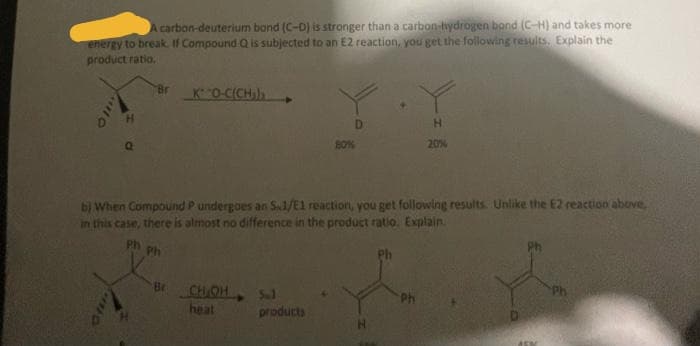carbon-deuterium bond (C-D) is stronger than a carbon tydrogen bond (C-H) and takes more energy to break. If Compound Q is subjected to an E2 reaction, you get the following results, Explain the product ratio. Br K O-C(CH)) D. BO% 20% b) When Compound P undergoes an S.1/E1 reaction, you get following results. Unlike the E2 reaction above in this case, there is almost no difference in the product ratio. Explain Ph Ph
carbon-deuterium bond (C-D) is stronger than a carbon tydrogen bond (C-H) and takes more energy to break. If Compound Q is subjected to an E2 reaction, you get the following results, Explain the product ratio. Br K O-C(CH)) D. BO% 20% b) When Compound P undergoes an S.1/E1 reaction, you get following results. Unlike the E2 reaction above in this case, there is almost no difference in the product ratio. Explain Ph Ph
Chemistry
10th Edition
ISBN:9781305957404
Author:Steven S. Zumdahl, Susan A. Zumdahl, Donald J. DeCoste
Publisher:Steven S. Zumdahl, Susan A. Zumdahl, Donald J. DeCoste
Chapter1: Chemical Foundations
Section: Chapter Questions
Problem 1RQ: Define and explain the differences between the following terms. a. law and theory b. theory and...
Related questions
Question
100%

Transcribed Image Text:A carbon-deuterium bond (C-D) is stronger than a carbon hydrogen bond (C-H) and takes more
energy to break If Compound Q is subjected to an E2 reaction, you get the following results. Explain the
product ratio.
Br
K O-C(CH)
H.
BO%
20%
b) When Compound P undergoes an S.1/E1 reaction, you get following results. Unlike the E2 reaction above,
in this case, there is almost no difference in the product ratio. Explain
Ph
Ph
Bre
CHIOH
heat
Sal
anpoud
Expert Solution
This question has been solved!
Explore an expertly crafted, step-by-step solution for a thorough understanding of key concepts.
This is a popular solution!
Trending now
This is a popular solution!
Step by step
Solved in 2 steps

Knowledge Booster
Learn more about
Need a deep-dive on the concept behind this application? Look no further. Learn more about this topic, chemistry and related others by exploring similar questions and additional content below.Recommended textbooks for you

Chemistry
Chemistry
ISBN:
9781305957404
Author:
Steven S. Zumdahl, Susan A. Zumdahl, Donald J. DeCoste
Publisher:
Cengage Learning

Chemistry
Chemistry
ISBN:
9781259911156
Author:
Raymond Chang Dr., Jason Overby Professor
Publisher:
McGraw-Hill Education

Principles of Instrumental Analysis
Chemistry
ISBN:
9781305577213
Author:
Douglas A. Skoog, F. James Holler, Stanley R. Crouch
Publisher:
Cengage Learning

Chemistry
Chemistry
ISBN:
9781305957404
Author:
Steven S. Zumdahl, Susan A. Zumdahl, Donald J. DeCoste
Publisher:
Cengage Learning

Chemistry
Chemistry
ISBN:
9781259911156
Author:
Raymond Chang Dr., Jason Overby Professor
Publisher:
McGraw-Hill Education

Principles of Instrumental Analysis
Chemistry
ISBN:
9781305577213
Author:
Douglas A. Skoog, F. James Holler, Stanley R. Crouch
Publisher:
Cengage Learning

Organic Chemistry
Chemistry
ISBN:
9780078021558
Author:
Janice Gorzynski Smith Dr.
Publisher:
McGraw-Hill Education

Chemistry: Principles and Reactions
Chemistry
ISBN:
9781305079373
Author:
William L. Masterton, Cecile N. Hurley
Publisher:
Cengage Learning

Elementary Principles of Chemical Processes, Bind…
Chemistry
ISBN:
9781118431221
Author:
Richard M. Felder, Ronald W. Rousseau, Lisa G. Bullard
Publisher:
WILEY